|
|
|
Sort Order |
|
|
|
Items / Page
|
|
|
|
|
|
|
| Srl | Item |
| 1 |
ID:
182833
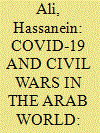

|
|
|
|
|
| Summary/Abstract |
The post-Arab Spring period witnessed the outbreak of devastating civil wars in Syria, Libya and Yemen. These wars had many disastrous impacts on these countries, which threatened their existence as political entities. The Covid-19 pandemic exacerbated the problems facing these countries, especially in light of the collapse of their infrastructure and health care systems. In spite of this, the pandemic and its consequences did not mitigate these civil wars. In this context, this article aims to answer the following question: Why do civil wars continue in the Arab world, despite the Covid-19 pandemic and its disastrous consequences? In other words, why didn't the pandemic create a new dynamic that pushes for the settlement of the civil wars in Syria, Libya and Yemen?
The article provides five reasons to explain this phenomenon. First, the worsening situation in Syria, Libya, and Yemen before the emergence of the Covid-19 pandemic, due to civil wars in these countries turning into protracted conflicts. Second, the nature of the civil wars as proxy wars, due to the large number of regional and international actors that have been involved in each of them. Third, the expansion of war economies in these countries; this phenomenon feeds civil conflict and sustains it. Fourth, the disintegration of the nation state in Syria, Libya, and Yemen, due to the absence of a strong central government, and the multiplicity of actors that control the state's territory. Fifth, the inefficiency of the means to peacefully settle Arab civil wars, mainly through the political efforts of the United Nations.
|
|
|
|
|
|
|
|
|
|
|
|
|
|
|
|
| 2 |
ID:
182837


|
|
|
|
|
| Summary/Abstract |
India does not have an appropriate policy framework for the ASM sector. For the most part it is neglected, with several artisanal mines and activities even labelled “illegal”. The neglect, coupled with criminalization, creates barriers for an effective environmental management strategy. The complex legal framework for mineral ownership, mining and environmental regulation, bring with them another set of challenges. This paper examines in detail the environmental regulatory framework for ASM. I also unpack the assumptions informing the environmental regulatory framework, arguing that they primarily inform the medium and large- scale mining (LSM) sector without being tailor made for the needs of the ASM sector. I argue this in the context of India, attempting to point out the specific challenges for the ASM sector and the possible ways forward in rethinking the framework.
|
|
|
|
|
|
|
|
|
|
|
|
|
|
|
|
| 3 |
ID:
182832
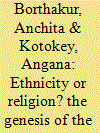

|
|
|
|
|
| Summary/Abstract |
Since the emergence of the Taliban in the national scene of Afghanistan, speculations have abounded around whether to call the movement a Pashtun nationalist movement or should it be termed as a radical Islamic movement having supra ethnic tendencies? It can be viewed that the Taliban movement in Afghanistan neither has its origin directly in the Pashtun tribal culture nor in the tradition of Islam. The leaders of the movement tend to use both these identities voluntarily based on circumstances. Depending on the aims and objectives in a given situation, both these identities are instrumentalized by the Taliban leaders to recruit more fighters and also to carry on with the political aspect of strategic decision making. Moreover, in the post 2001 scenario Afghan Taliban's principal ambition is to fight for national liberation against the presence of foreign forces and their local allies in Afghanistan under the banner of ‘divinely decreed Jihad’.
|
|
|
|
|
|
|
|
|
|
|
|
|
|
|
|
| 4 |
ID:
182831
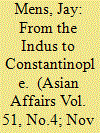

|
|
|
|
|
| Summary/Abstract |
This article argues that Napoleon Bonaparte's attempt to reach India, firstly through Egypt and then through Qajar Persia, inaugurated the ‘Middle East' as a coherent political space in international politics. The ostensibly existential threat posed by French schemes to British dominion over India prompted British Indian officials to perceive Egypt, Persia and the Gulf Emirates through the lens of Indian defence and European geopolitics for the first time. By the end of this period, these lands were imagined as a salient, somewhat coherent political space between “the Indus and Constantinople”. This first ‘Middle East’ was the product of the globalization of European geopolitics and the need to defend British India, auguring the future of the region, in which its political importance, and even its location, was constructed in relation to the broader context of international affairs.
|
|
|
|
|
|
|
|
|
|
|
|
|
|
|
|
| 5 |
ID:
182834


|
|
|
|
|
| Summary/Abstract |
This article summarises the major environmental and social justice issues facing Yemen, with a discussion of climate change, the impact of the war, oil extraction practices and water use. It also includes two brief case studies as examples of the impact of these issues in worsening inequality: first, the series of disastrous floods in 2020 and, second, the situation in Soqotra.
|
|
|
|
|
|
|
|
|
|
|
|
|
|
|
|
| 6 |
ID:
182829


|
|
|
|
|
| Summary/Abstract |
The article explores the political and diplomatic response from Kazakh and Kyrgyz governments towards China regarding its post-2014 Xinjiang security strategy. The policy, which includes repressive measures against Xinjiang Muslim minorities, has led to the detention of a significant number of ethnic Kazakh and Kyrgyz, thus calling for a reaction from their kin states. In order to explain the complexity of the problem, the article looks via a neorealist lens at the role of Kazakh and Kyrgyz human rights advocacy groups in urging local authorities to securely release ethnic Kazakh and Kyrgyz detained in Xinjiang's “vocational camps”. It further explores official responses from Kazakh and Kyrgyz governments, identifying their considerations and foreign policy choices. This article concludes that Kazakh and Kyrgyz governments neither possess economic and political leverage to press on China over the Xinjiang issue nor are they willing to do so as this may jeopardize their cooperation with China.
|
|
|
|
|
|
|
|
|
|
|
|
|
|
|
|
| 7 |
ID:
182830
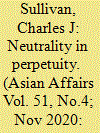

|
|
|
|
|
| Summary/Abstract |
Since the passing of Turkmenistan's first president, Saparmurat Niyazov, in late 2006, Gurbanguly Berdymukhamedov has ruled over Turkmenistan. Although authoritarian regimes occasionally undergo reform following a transition from one leader to the next, the dictatorship in Ashgabat remains intact and Berdymukhamedov has not modified his predecessor's foreign policy doctrine. Why though has Turkmenistan chosen not to revise its “permanent neutrality” status under new leadership? This article stipulates that the ruling elites in Ashgabat have preserved Turkmenistan's neutrality for three reasons. First, in contrast to other isolated dictatorships, the government of Turkmenistan does not have to contend against any state adversaries or antagonize a foreign power to legitimate its rule. Instead, Turkmenistan portrays itself in the United Nations General Assembly as an exemplary neutral state and this affords the regime latitude in navigating geopolitics. Second, while Berdymukhamedov has revised aspects of the Niyazov dictatorship, the Arkadag personality cult heralds him as the “protector” of Turkmenistan's sovereignty. “Permanent neutrality” thus undergirds the president's political legitimacy to some degree. Third, Turkmenistan's neutrality contributes to the ruling elites' maintenance of a corrupt and repressive regime through which they exert control over the economy. Hence, in spite of many challenges facing the country, the ruling regime will likely endure.
|
|
|
|
|
|
|
|
|
|
|
|
|
|
|
|
| 8 |
ID:
182836
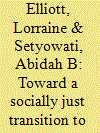

|
|
|
|
|
| Summary/Abstract |
In 2019, the Indonesian government released its post-Paris Agreement report Low Carbon Development: a paradigm shift towards a green economy in Indonesia, in which it set out an economic rationale for a move to low carbon growth. The core of the paradigm shift referenced in the report's title was that growth not only had to be decoupled from high carbon inputs but that in both practice and outcomes it had to be sustainable and inclusive. Yet the report does little to define social justice, equity practices, or inclusive outcomes in a green economy context. In this article, we foreground distributive, procedural and recognition aspects of social justice that are central to Indonesia's climate mitigation efforts and transition to a green, low carbon economy. We focus on two sectors that are key to this transition – forest and land-use, and energy. Our analysis shows that existing forms of injustice can exacerbate challenges for decarbonisation action and that low carbon transitions initiatives have been unable to overcome various forms of injustice and have, in some cases, created new injustices.
|
|
|
|
|
|
|
|
|
|
|
|
|
|
|
|
| 9 |
ID:
182838
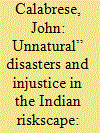

|
|
|
|
|
| Summary/Abstract |
The vulnerabilities that turn natural hazards such as hurricanes and earthquakes into disasters are rooted in inequality. The overarching aim of this article is to shed light on the nexus between social justice principles and the mitigation of disaster impacts. The article uses ‘disaster justice’ – an offshoot of ‘environmental justice’ – as a conceptual lens to help enrich understanding of the differential impacts of disasters upon communities and to craft more inclusive policies and programmes. In India, among the world's most disaster-prone countries, as elsewhere, there is growing recognition that children and youth, who assume a disproportionate share of the burden created by disasters, are an underutilized demographic force multipliers for disaster risk reduction. The country's multi-hazard risk and vulnerability profile has led Indian non-governmental organisations (NGOs) not just to provide post-disaster relief but increasingly to integrate into their work programs designed to unleash the potential of young people to develop the resilience of their communities.
|
|
|
|
|
|
|
|
|
|
|
|
|
|
|
|
|
|
|
|
|